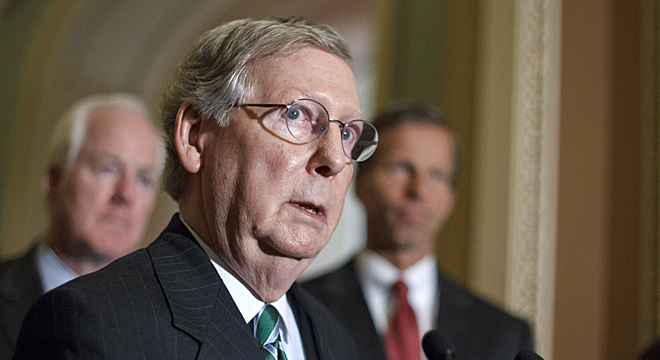Let me be the first to say that Republicans in Congress have perfectly good reasons for not wanting to return to “regular order” budgeting, just like Democrats had good reasons for not wanting to pass a budget the past four years and Republicans had good reason during that time to pressure Democrats to return to the “regular order” budgeting they now oppose.
But they’re not reasons anyone’s admitting to, and they’re definitely not evidence one party has a greater commitment to the rules and norms of budgeting than the other. It really all comes down to the fact that Republicans can’t negotiate budget policy without the threat of a debt default looming over the whole process.
They’re not even doing a great job of hiding it.
As Ted Cruz, and later Mitch McConnell, explained in front of the cameras this week, Republicans won’t agree to move ahead with budget negotiations unless Democrats agree in advance that a budget bill won’t raise taxes or the debt limit.
“The main point here is we don’t feel that we ought to enable the Democrats to produce an outcome that raises the debt ceiling without doing anything about the debt or raises taxes,” McConnell said yesterday.
As I noted before that’s a lot like saying “first surrender, then we’ll fight.” It’s also a peculiar admission that Republicans have no mettle, since any budget deal will have to be bipartisan — even one that raises taxes and the debt limit. Moving to a conference committee doesn’t “enable” Democrats to do anything Republicans won’t agree to. (It’s also funny and revealing to hear McConnell sound the alarm about the debt then block off the revenue channel.)
What’s left after you strip away all that obfuscation is that Republicans don’t want to go to conference unconditionally because they’re concerned their position won’t hold politically and they’ll ultimately be forced to swallow a compromise that includes tax increases — unless the whole process gets swallowed by another debt limit fight.
That’s mainly because the Republicans’ position in budget negotiations is as brittle as it is uncompromising and they don’t want to expose it to the wages of politics. They don’t want to repeat a losing election year debate about taxes and social spending in an open legislative context.
The rules open the House floor to a flood of privileged measures when budget negotiators gridlock, and, as Paul Ryan rightly noted at the Pete Peterson fiscal summit yesterday, that means Democrats will try to shorten their leashes, by, for instance, proposing to make entitlement cuts off limits. (Bernie Sanders showed how it’s done in the Senate already.) That means if Republicans truly want those entitlement cuts, they’ll have to whip votes and own them. It also means their commitment to sequestration over higher taxes on rich people will be tested.
The whole problem from the GOP perspective is that returning to “regular order” makes budgeting much more small-d democratic and thus much more likely to result in the sort of “balanced” plan President Obama has proposed.
Unless, that is, the whole process runs up against the debt limit.
In a threatening climate like that they might be able to wrest back some control over the process. If Obama’s “charm offensive” pays dividends, they might even be able to direct the threat of default back on their own members when rank and file Republicans once again find themselves isolated from the rest of Congress. But what they definitely can not do is prevail in a traditional budget fight, without the specter of economic calamity hanging over Congress.
That’s why Ryan’s telling the Washington Post, “The debt limit is the backstop…. I’d like to go through regular order and get something done sooner rather than later. But we need to get a down payment on the debt. We need entitlement reform.”
That’s why Jeff Sessions, the top Republican budget guy, is saying, “We need to realize this debt ceiling is out there. It’s inevitable. It’s coming… sometimes we don’t want to act until a gun is at our heads.”
That’s why Sens. Cruz and Mike Lee are saying inscrutable things like describing a formal, bipartisan budget negotiation — recorded votes and all — as a “backroom deal” that might take the debt limit off the table.
And that’s why we can’t have nice things.







